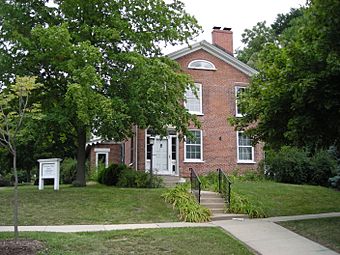Hunt House (St. Charles, Illinois) facts for kids
Quick facts for kids |
|
|
Hunt House
|
|
 |
|
| Location | 304 Cedar Ave., St Charles, Kane County, Illinois, United States |
|---|---|
| Built | 1841 |
| Architectural style | Greek Revival |
| NRHP reference No. | 82000397 |
| Added to NRHP | November 12, 1982 |
The Hunt House, once called the Dunham–Hunt Museum, is a very old and important house in St. Charles, Illinois. It is listed on the National Register of Historic Places, which means it's a special building worth protecting. Many people believe it is the oldest brick house in St. Charles.
Contents
History of the Hunt House
Bela Hunt's Early Life and Move to Illinois
Bela Thaxter Hunt was born in Abington, Massachusetts in 1812. When he was 21 years old, he left Massachusetts in 1833. In 1836, he moved to the Fox River valley in Illinois.
Bela's brother helped him decide to settle in the area. This place later became known as St. Charles, Illinois.
Building St. Charles: Hunt's Contributions
Bela Hunt played a big part in helping St. Charles grow. He bought a large piece of land, more than 200 acres. At that time, the rest of the settlement was only about 25 acres.
In 1836, Hunt supervised the building of the town's first wooden frame building. A year later, in 1837, he bought a small hotel. The very first election in St. Charles happened at this hotel.
Hunt also built several other businesses in the downtown area. He even sold beds in nearby Chicago.
Hunt's Public Service and Businesses
In 1841, Bela Hunt was elected the first Kane County Treasurer. This meant he was in charge of the county's money. Later that same year, he started a factory that made linseed oil.
Hunt built the Hunt House in 1841. He used bricks made locally from Penny's Brickyard. This brickyard is now Baker Park.
Bela Hunt continued to be an important businessman. In 1844, he started a paper mill. This was the first paper mill northwest of the Ohio River. It eventually employed more than 80 people.
In 1850, Hunt opened a tannery, which made leather. He used the leather to make harnesses, boots, and shoes. For many years, until 1890, he ran a hardware business.
Hunt's Later Life and Family Legacy
Bela Hunt also served as a major in the American Civil War. He passed away on October 23, 1908.
His son, Frank B. Hunt, later became the third mayor of St. Charles. His grandson, Edwin M. Hunt, was the eleventh mayor. The Hunt family left a lasting mark on the city.
The House Becomes a Museum
The Hunt House stayed in the Hunt family for a long time. In 1980, it was sold to a member of the Dunham family. The Dunham family was another important early family in Kane County.
After being carefully restored, the first floor of the house opened as a museum. In 1982, it was officially listed on the National Register of Historic Places. The house was then given to the city of St. Charles in 1986.
In the 2010s, the city found it hard to pay for the house's upkeep. Because of this, the property was put up for sale.
Architecture of the Hunt House
Building Materials and Style
The Hunt House was the first house in St. Charles to be built with bricks. Before this, most houses were made of wood or were log cabins.
The house is located on the northwest corner of Third and Cedar Streets. It was built in the Greek Revival style. This style was popular in the 1800s and often used elements from ancient Greek temples.
The house still looks very much like its original design. This is because the Hunt family owned it for so many years.
House Shape and Features
The Hunt House is shaped like a rectangle and has a gable roof. A gable roof has two sloping sides that meet at a ridge.
The front and back entrances of the house match the fancy Greek Revival style. Some parts were added to the side and back of the house before 1855. A second story was added to one of these additions before 1920, likely in the 1870s.
Some details on the fascia (the flat board under the roof's edge) show influence from Gothic Revival architecture. The inside layout of the house has not changed much since it was built.

